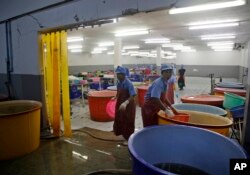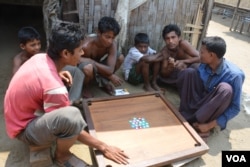Thailand's military government is expressing appreciation for its upgrade on a closely watched index of human trafficking. Meanwhile, officials in Myanmar are lamenting the country being blacklisted in the U.S. State Department's annual Trafficking in Persons (TIP) report.
Thailand, moved up from the lowest Tier 3 to the Tier 2 Watchlist, meaning while the country “does not fully meet the minimum standards for the elimination of trafficking," it made significant improvements last year, according to the report.
“Thailand will by no means be complacent,” the Ministry of Foreign Affairs said in a statement. “We remain focused and committed to tackling human trafficking in all forms.”
Prime minister Prayuth Chan-ocha, head of the military junta governing the kingdom, told reporters a "zero tolerance" policy will continue and "I will do my job."
“Thailand has made some great progress that we should all applaud over the past year," the U.S. ambassador to the kingdom, Glyn Davies, said. A number of organizations, however, are criticizing the U.S. decision to upgrade Thailand.
“We are very disappointed at this decision, which does not, in our view, accurately assess the situation on the ground,” said Judy Gearhart, executive director of the International Labor Rights Forum. “Migrant workers are still one of the most vulnerable groups in the country to human trafficking, and Thailand has not shown any indication that it intends to allow migrant workers greater access to fundamental rights that would protect them from exploitation.”
Thailand should have stayed on the blacklist while Malaysia (which remains on the Tier 2 Watchlist) should have been downgraded to the bottom rung, according to Fortify Rights, which said the two countries, along with Myanmar, “failed to sufficiently combat human trafficking and protect survivors last year.”
Thailand effectively switched places with neighbor Myanmar, the source of an estimated several million laborers in the kingdom, many of them undocumented.
About one-fifth of Thai exports are derived from agricultural and fishery exports – industries rife with abuse of laborers.
Exploitation of migrants has been endemic for decades in the region, with traffickers coordinating with corrupt and complicit officials in government, immigration control, militaries and police forces.
The 2016 TIP report characterizes Myanmar (also known as Burma) as “a source country for men, women, and children subjected to forced labor and for women and children subjected to sex trafficking, both in Burma and abroad.”
Diplomats have also expressed disappointment with a lack of government attention to the plight of the Rohingya, a Muslim minority mostly residing in Rakhine state, who Myanmar does not recognize as a distinct ethnic group.
Since Aung San Suu Kyi’s National League for Democracy came to power this year – succeeding military rulers – the government has not shown any flexibility on the Rohingya issue, emphasizing it regards them as Bengalis who illegally migrated from Bangladesh.
Although the TIP report covers the period before the change of government, some observers view the downgrade – in part – as punishment for a continuing hardline on the Rohingya, who annually flee Myanmar in the thousands on rickety boats supplied by traffickers.
Myanmar officials on Friday were contrite about being relegated to the TIP blacklist – along with Haiti, Sudan and Uzbekistan – pledging to continue to battle the traffickers.
“We will not change our course of action on this,” Foreign Ministry Permanent Secretary Aung Lin told VOA. “We’ll continue our effort to take necessary action and to work with all the parties concerned, including the United States.”
A ministry news release about the TIP report made reference to the Rohingya, but did not mention them by name, stating that it had “saved, sheltered and repatriated voluntarily” those “irregular migrants cast adrift in the Indian Ocean” most of whom “were proven not to have originated from Myanmar.”
Several non-governmental organizations contend political considerations remain an influence on the State Department list, something diplomats have previously acknowledged in private.
The chairman of the U.S. House of Representatives panel on human rights supports the stance that the White House continues to insert such considerations into the global grading system.
“That violates the spirit and letter of the statute,” said Rep. Chris Smith, a New Jersey Republican. “Tier rankings must be earned, not meted out as gifts to economic and security partners.”
The congressman, in particular, singled out China’s Tier 2 Watch List rating, calling the country “the black hole of human trafficking.”
The TIP report ranks countries’ on efforts to combat human trafficking according to standards set forth in the U.S. Trafficking Victims Protect Act. Tier 1 governments meet the minimum standards; Tier 2 nations are making significant efforts to meet the minimum standards while those on the Tier 2 "Watch List" deserve special scrutiny. Tier 3 countries are deemed to have failed to comply with the minimum U.S. standards and are not making significant efforts to do so.







